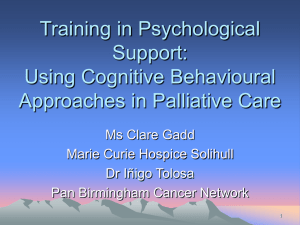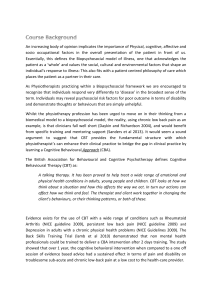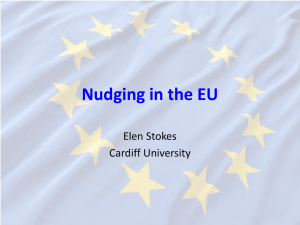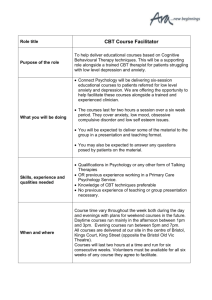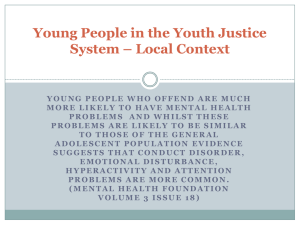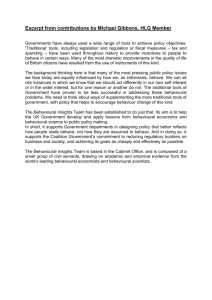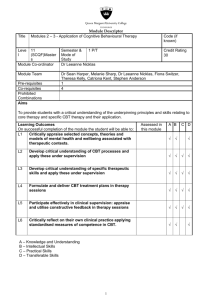Anger management related needs of pupils in key stage 3: Effectiveness of group CBT intervention
advertisement
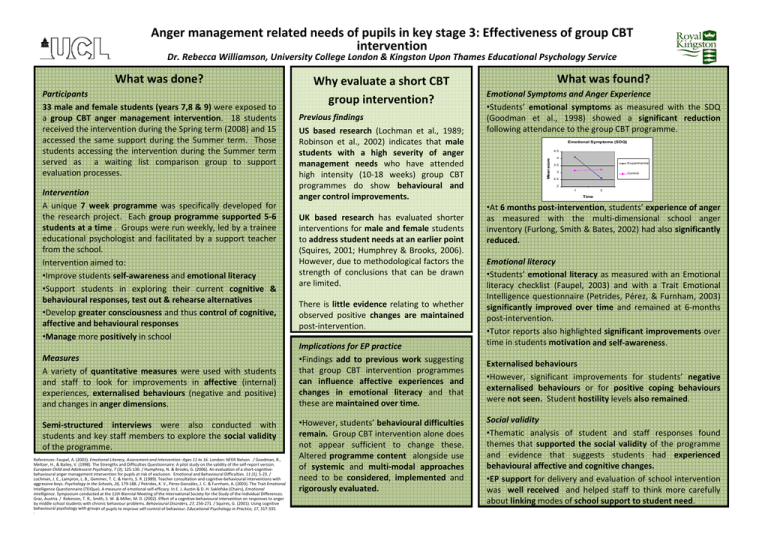
Anger management related needs of pupils in key stage 3: Effectiveness of group CBT intervention Dr. Rebecca Williamson, University College London & Kingston Upon Thames Educational Psychology Service Participants 33 male and female students (years 7,8 & 9) were exposed to a group CBT anger management intervention. 18 students received the intervention during the Spring term (2008) and 15 accessed the same support during the Summer term. Those students accessing the intervention during the Summer term served as a waiting list comparison group to support evaluation processes. Intervention A unique 7 week programme was specifically developed for the research project. Each group programme supported 5‐6 students at a time . Groups were run weekly, led by a trainee educational psychologist and facilitated by a support teacher from the school. Intervention aimed to: •Improve students self‐awareness and emotional literacy •Support students in exploring their current cognitive & behavioural responses, test out & rehearse alternatives •Develop greater consciousness and thus control of cognitive, affective and behavioural responses •Manage more positively in school Measures A variety of quantitative measures were used with students and staff to look for improvements in affective (internal) experiences, externalised behaviours (negative and positive) and changes in anger dimensions. Semi‐structured interviews were also conducted with students and key staff members to explore the social validity of the programme. References: Faupel, A. (2003). Emotional Literacy, Assessment and Intervention: Ages 11 to 16. London: NFER Nelson. / Goodman, R., Meltzer, H., & Bailey, V. (1998). The Strengths and Difficulties Questionnaire: A pilot study on the validity of the self‐report version. European Child and Adolescent Psychiatry, 7 (3), 125‐130. / Humphrey, N. & Brooks, G. (2006). An evaluation of a short‐cognitive‐ behavioural anger management intervention for pupils at risk of exclusion. Emotional and Behavioural Difficulties. 11 (1), 5‐23. / Lochman, J. E., Lampron, L. B., Gemmer, T. C. & Harris, S. R. (1989). Teacher consultation and cognitive‐behavioural interventions with aggressive boys. Psychology in the Schools, 26, 179‐188. / Petrides, K. V., Pérez‐González, J. C. & Furnham, A. (2003). The Trait Emotional Intelligence Questionnaire (TEIQue). A measure of emotional self‐efficacy. In E. J. Austin & D. H. Saklofske (Chairs), Emotional intelligence. Symposium conducted at the 11th Biennial Meeting of the International Society for the Study of the Individual Differences. Graz, Austria. / Robinson, T. R., Smith, S. W. & Miller, M. D. (2002). Effect of a cognitive‐behavioural intervention on responses to anger by middle school students with chronic behaviour problems. Behavioural Disorders, 27, 256‐271. / Squires, G. (2001). Using cognitive behavioural psychology with groups of pupils to improve self‐control of behaviour. Educational Psychology in Practice, 17, 317‐335. : Why evaluate a short CBT group intervention? Previous findings US based research (Lochman et al., 1989; Robinson et al., 2002) indicates that male students with a high severity of anger management needs who have attended high intensity (10‐18 weeks) group CBT programmes do show behavioural and anger control improvements. UK based research has evaluated shorter interventions for male and female students to address student needs at an earlier point (Squires, 2001; Humphrey & Brooks, 2006). However, due to methodological factors the strength of conclusions that can be drawn are limited. There is little evidence relating to whether observed positive changes are maintained post‐intervention. Implications for EP practice •Findings add to previous work suggesting that group CBT intervention programmes can influence affective experiences and changes in emotional literacy and that these are maintained over time. •However, students’ behavioural difficulties remain. Group CBT intervention alone does not appear sufficient to change these. Altered programme content alongside use of systemic and multi‐modal approaches need to be considered, implemented and rigorously evaluated. What was found? Emotional Symptoms and Anger Experience •Students’ emotional symptoms as measured with the SDQ (Goodman et al., 1998) showed a significant reduction following attendance to the group CBT programme. Emotional Symptoms (SDQ) 4.5 Mean score What was done? 4 Experimental 3.5 3 Control 2.5 2 1 2 Time •At 6 months post‐intervention, students’ experience of anger as measured with the multi‐dimensional school anger inventory (Furlong, Smith & Bates, 2002) had also significantly reduced. Emotional literacy •Students’ emotional literacy as measured with an Emotional literacy checklist (Faupel, 2003) and with a Trait Emotional Intelligence questionnaire (Petrides, Pérez, & Furnham, 2003) significantly improved over time and remained at 6‐months post‐intervention. •Tutor reports also highlighted significant improvements over time in students motivation and self‐awareness. Externalised behaviours •However, significant improvements for students’ negative externalised behaviours or for positive coping behaviours were not seen. Student hostility levels also remained. Social validity •Thematic analysis of student and staff responses found themes that supported the social validity of the programme and evidence that suggests students had experienced behavioural affective and cognitive changes. •EP support for delivery and evaluation of school intervention was well received and helped staff to think more carefully about linking modes of school support to student need.
